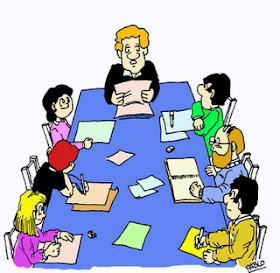Funciones del profesor: "Un pulso al fracaso" (The functions of the teacher: "A Pulse to Failure")
¡Holi a todas las estrellitas!
Todos sabemos que uno de los ejes centrales de la educación es el profesor, el maestro, el docente. Es aquel que pasa más tiempo con nosotros casi que nuestros padres, el encargado de trasmitir el conocimiento de lengua, mates, inglés, etc. Pero, ¿cuáles son exactamente las funciones del docente?
- La programación y la enseñanza de las áreas, materias, módulos o ámbitos curriculares que tengan encomendados.
- La evaluación del proceso de aprendizaje del alumnado, así como la evaluación de los procesos de enseñanza.
- La tutoría de los alumnos, la dirección y la orientación de su aprendizaje y el apoyo en su proceso educativo, en colaboración con las familias.
- La orientación educativa, académica y profesional de los alumnos, en colaboración, en su caso, con los servicios o departamentos especializados.
- La atención al desarrollo intelectual, afectivo, psicomotriz, social y moral del alumnado.
- La promoción, organización y participación en las actividades complementarias, dentro o fuera del recinto educativo, programadas por los centros.
- La contribución a que las actividades del centro se desarrollen en un clima de respeto, de tolerancia, de participación y de libertad para fomentar en los alumnos los valores de la ciudadanía democrática y de la cultura de paz.
- La información periódica a las familias sobre el proceso de aprendizaje de sus hijos e hijas, así como la orientación para su cooperación en el mismo.
- La coordinación de las actividades docentes, de gestión y de dirección que les sean encomendadas.
- La participación en la actividad general del centro.
- La participación en los planes de evaluación que determinen las Administraciones educativas o los propios centros.
- La investigación, la experimentación y la mejora continua de los procesos de enseñanza correspondientes.
- Los profesores realizarán las funciones expresadas en el apartado anterior bajo el principio de colaboración y trabajo en equipo.
///
ENGLISH
Holi to all the little stars!
We all know that one of the central axes of education is the teacher. It is the one who spends more time with us almost than our parents, the one in charge of transmitting the knowledge of language, maths, English, etc. But what exactly are the functions of the teacher?
The teacher has 13 functions that are included in the current law (the LOMLOE) and are as follows:
- The programming and teaching of the areas, subjects, modules or curricular areas entrusted to them.
- The evaluation of the students' learning process, as well as the evaluation of the teaching processes.
- The tutoring of the students, the direction and guidance of their learning and the support in their educational process, in collaboration with the families.
- The educational, academic and professional guidance of the students, in collaboration, where appropriate, with specialized services or departments.
- The attention to the intellectual, affective, psychomotor, social and moral development of the students.
- The promotion, organization and participation in the complementary activities, inside or outside the educational premises, programmed by the centers.
- The contribution to ensure that the center's activities take place in a climate of respect, tolerance, participation and freedom in order to foster in the students the values of democratic citizenship and the culture of peace.
- The periodic information to the families about the learning process of their sons and daughters, as well as the orientation for their cooperation in it.
- The coordination of the teaching, management and direction activities entrusted to them.
- Participation in the general activity of the center.
- Participation in the evaluation plans determined by the educational administrations or the centers themselves.
- Research, experimentation and continuous improvement of the corresponding teaching processes.
- Teachers will perform the functions expressed in the previous section under the principle of collaboration and teamwork.
In class, we watched a documentary called "A Pulse to Failure", a video that explains how second chance centers work. In these centers, where the individual is served above the academic level, the management function is paramount.
To begin with, it is the teachers themselves who conduct the selection interviews, explaining to the students what the conditions of the center are. They analyze each student individually; in this way they can better guide them and help them with their personal problems. Often, even the solutions they propose depend on the individual. From the management, teachers are encouraged to bring out the potential of their students, being aware that they are not going to finish the syllabus, and that they must believe in the students in order to show them a profession and values. In addition, activities are organized outside the classroom with different objectives and the center promotes volunteering in the neighborhood, in which these students would teach a skill.
If you watch the documentary, you will be able to see the real effort made by the teachers in their activity of managing the center. There, the students find themselves in complicated situations, and for that reason, teamwork is promoted to reach a goal, that these students leave with values and trade.
I highly recommend you to watch this documentary. If you do, leave me your opinion in the comments. If not, what do you think is the most important role of a teacher, and which ones did you not know?
See you, startlets ;)





¡Totalmente de acuerdo en que los profesores están muy infravalorados! Creo que en general vemos la superficie de la profesión en vez de ver todo el trabajo que hay por detrás. La verdad, todos las funciones que has mencionado me parecen muy importantes. De hecho, viendo la lista me he dado cuenta de que dar las clases es solo una parte pequeña de la docencia. ¡La que se nos viene!
ResponderEliminar